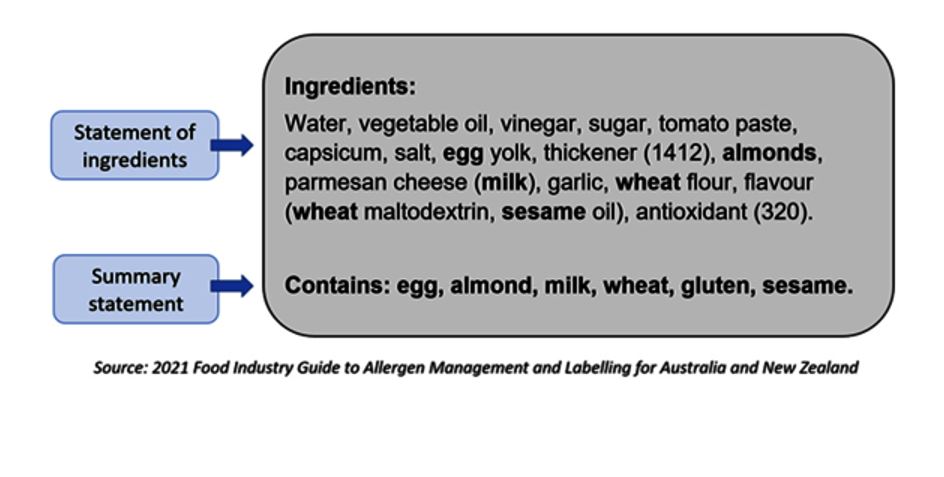Confused about the Food Labelling Changes?
Food Labelling Changes Will Impact Any Business Selling Food!
In just over three months it will be mandatory for all hospitality venues that sell food to clearly display information about the allergens the food contains.
This applies not just to packaged goods but also to portions sold individually – in other words out of your display cabinets.
Here’s a brief summary of what you need to know, and do, but be aware this is not intended as a definitive or complete legal explanation, and we urge any of our members or friends who are unsure, or have any doubts to contact the necessary authorities or advisers.
Allergens that can cause allergic reactions including anaphylaxis, immune reactions such as Coeliac disease, and other adverse health reactions like asthma had previously been identified, and labelling laws developed to ensure people were properly warned. In 2021, Food Standards Australia New Zealand determined that new Plain English Allergen Labelling (PEAL) requirements were necessary to ensure food allergen information is clearer and easier to find on food labels. Making the announcement the FSANZ conceded three years for implementation of the new rules, declaring February 2024 as the deadline for all affected businesses to comply.
What many people may not have understood when this announcement was made are the implications the plain English labelling requirements have on food sold in any form, not just packaged goods.
Under the current rules food available for retail sale not required to bear a label, includes:
• whole fruit and vegetables
• takeaway food
• food made and packaged on the premises from which it is sold.
• food packaged in the presence of the purchaser.
From next February, all hospitality venues selling food must display signage that advises customers of the allergens contained in the food, or, at the very least, have that information available in a leaflet or other form of printed material if requested by the customer.
These declarations must be made in two forms – a statement of the ingredients, and in a distinctly separate summary, a summary of the allergens.

In the statement of ingredients, the allergen must be printed in bold, as shown in the above examples, in no smaller type than the rest of the information and must state specifically what the allergen is. This requirement changes what has been acceptable for allergens in the past, for example nuts. Under the new rules nuts cannot be grouped and must be named e.g. Almonds, Hazelnuts, Peanuts etc.
Every ingredient that has an allergen must declare it. So, if milk is contained in three different ingredients, it must be declared three separate times, e.g. Cream (Milk), Whey Powder (Milk), Butter (Milk). These words are mandatory and cannot be exchanged for, example, “dairy”. Similarly, Wheat must be declared on its own and not hidden in a general term such as “cereals”. Spelt must be declared as Wheat, and an item such as “Triticale” (Wheat, Rye). A list of the words to be used is included below, and again, we caution you, if you are unsure of anything, please check with the relevant authorities.
The Summary statement begins with the word Contains, and is followed by a summary of all the allergens, in a bold type face, again no smaller than the rest of the statement. The strict set of guidelines are laid out in the official post from Food Standards Australia New Zealand which can be found at: https://www.foodstandards.gov.au/consumer/labelling/Pages/allergen-labelling.aspx. The Queensland government has also provided information on the changes at:https://www.health.qld.gov.au/data/assets/pdf_file/0030/1126947/allergen-labelling.pdf
We urge you to read the information in these links carefully.
While the Coffee Commune understands the importance of food labelling regulations, once again we wonder whether the officers who are formulating these standards have any sense of the burden they are imposing on small businesses already struggling with volumes of red tape and compliance. Any hospitality business owner who makes sandwiches or rolls, wraps, other take away foods to order, must ensure that they are compliant or face hefty fines. That in itself is a substantial workload confronting business owners. To our way of thinking this is just another, in a long line of instances, where government has failed to consult with industry, and how the people whose livelihoods are at stake will be impacted by these changes.




